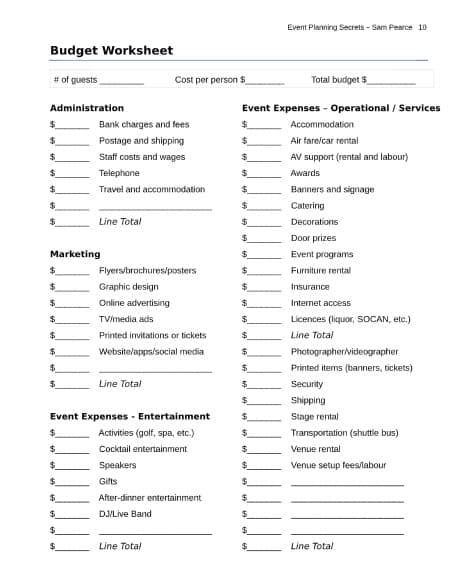The budget may define how lavish your event can be, but it doesn’t have to affect your success. Unforgettable events can be achieved with modest budgets if you plan carefully.
The first step is determining the size of the budget required, and if needed, seeking approval from the person or team overseeing the finances.
If this is your first time planning an event, the easiest way to estimate the size of the budget needed is on a per-person basis. If you’re inviting 100 people at $100 each, plan to spend $10K
Click to download the event budget worksheet
Be realistic
The overall cost of hosting an event can look relatively expensive. Once you consider all the little details, it’s not uncommon to spend $100 to $200 per guest. Double or triple that number if guests are visiting from out of town and you need to cover their travel and lodging expenses.
Is it worth it? In most cases, it’s money well-spent. Think about how much these guests mean to you and the motivation, energy, and excitement they’ll gain from the event. In the grand scheme of things, it’s a small price to pay to build strong relationships.
Is this a business expense?
In Canada, company events are typically a tax-deductible expense. Talk to an accountant about the details, as certain rules do apply. For instance, your expenses are only eligible for the 100% deduction if all of your employees are invited. Smaller parties for individual teams within the company don’t count.
Set your priorities
Decide which aspects of the event are important to you and where you should spend most of your budget. Is it vital to have a picturesque event? Spend the bulk of your budget on the venue and décor. Will a culinary feast and after-dinner entertainment excite your guests? Prioritize catering and live entertainment!
Make a list of everything you need. Even better, create two lists – one with essentials items and the other with items that would be nice, if the budget allows.
Some things on your list may cost more than you initially think, so be prepared to shift funds from one area of your budget to another. However, try to keep on track and stay within your overall budget. You don’t want to spend too much in one area, then not have enough for others.
Reference previous events
If your company has hosted this type of event in the past, the previous budgets will be a great resource. This will also act as a good motivation to keep the books in order so you have something to reflect on in the future. If you see $7500 was spent on entertainment for last year’s event, it will give you a good idea of how much to budget this year.
Sponsors
Are you planning the type of event where you could find sponsors to cover some of the expenses? If you’re willing to let them advertise at your event (printing their logo on posters, banners, etc.) getting a few sponsors on your side could make a big difference. Reach out to businesses that you know (perhaps your customers or suppliers) and see if you can work out a win-win deal that benefits you both.
Contingency fund
It’s best to set aside 10% to 20% as a contingency fund; the latter if this is your first time hosting this event. Having this extra money earmarked for emergencies and extra expenses will ensure you stay under budget, even when you end up paying more for products and services than you initially imagined. If you find yourself a week away from the event and you haven’t spent the entire fund, you can surprise guests with extra entertainment or snazzy gifts.
Watch for hidden expenses! Decorations like fabric chair covers that typically rent for $5 to $10 each can quickly add hundreds to the cost of your event.
Limit drinking to save money
Not surprisingly, alcoholic drinks can be one of the largest expenses when hosting an event. However, if the bar is only open for a short time or you limit the type of drinks served, you can significantly reduce costs.
Limiting drinks to a small selection of cocktails or a few domestic beers will help minimize the costs and reduce the risk of over-buying if you need to purchase the alcohol before your event.
You can also have guests pay for their drinks. If you choose this option, it’s a nice idea to give everyone one or two free drink tickets, covering the cost of their initial couple of drinks.
Ask for extras
It never hurts to ask for a little extra from your vendors. They may be willing to throw in freebies to earn your business, especially if it doesn’t cost them anything. For example, when renting a venue, ask if you can get other rooms in the facility for free or at a discounted rate. You may be surprised how easy it is to gain access to an extra room for your cocktail hour.
Event budget worksheet
Click to download the event budget worksheet




